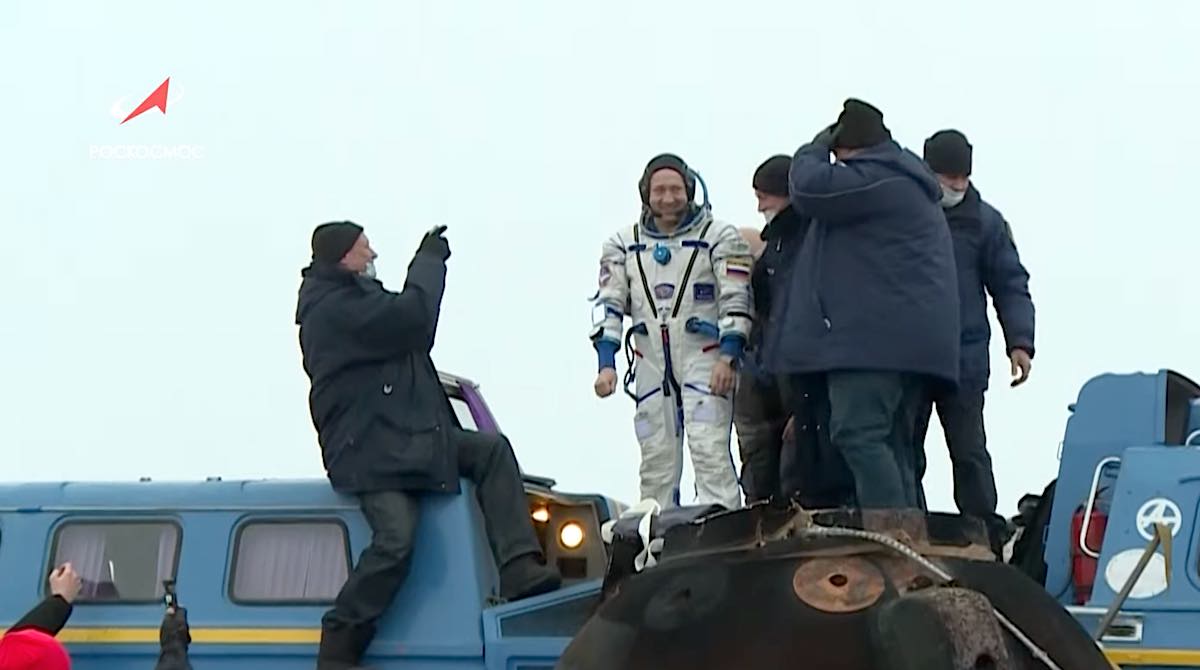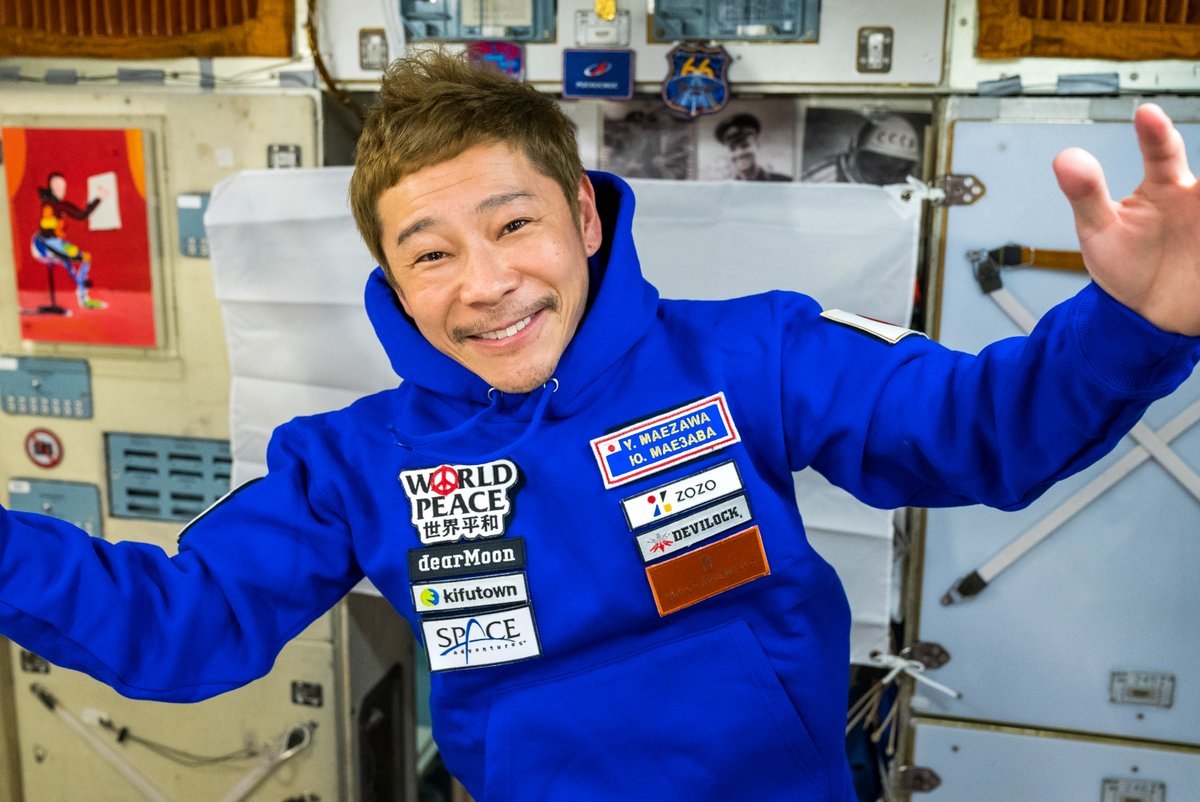Space News & Blog Articles
Japanese space tourists return to Earth
 Russian commander Alexander Misurkin smiles after getting out of the Soyuz MS-20 landing capsule, visible at bottom. Credit: Roscosmos
Russian commander Alexander Misurkin smiles after getting out of the Soyuz MS-20 landing capsule, visible at bottom. Credit: Roscosmos
Two Japanese space tourists and a veteran Russian cosmonaut departed the International Space Station and landed back on Earth Sunday, capping a 12-day mission with a parachute-assisted touchdown in frigid Kazakhstan.
The Soyuz MS-20 space capsule landed in Kazakhstan at 10:13 p.m. EST Sunday (0313 GMT Monday), about three-and-a-half hours after undocking from the space station.
Live views of the ship’s final descent and landing were not broadcast live on NASA TV or on a mission webcast provided by Roscosmos, the Russian space agency. Officials said poor weather prevented helicopters from quickly reaching the landing craft after touchdown.
Video from the landing site later showed two all-terrain vehicles pulled up alongside the Soyuz landing craft. Recovery teams helped Russian commander Alexander Misurkin, Japanese billionaire Yusaku Maezawa, and his producer-assistant Yozo Hirano from the capsule.
All three appeared in good health and good spirits, and stood on top of one off the off-road vehicles in their Sokol launch and entry spacesuits. They then entered one of the trucks for medical checks and to change out of their spacesuits.
Soyuz landings typically bring home crew members who have been in space six or more months. Those cosmonauts and astronauts take more time to re-acclimate to Earth’s gravity, and Russian ground teams carry the crew members to couches set up at the landing site.
But after a 12-day stay in orbit, Misurkin, Maezawa, and Hirono appeared to have no mobility problems after landing.
 Yusaku Maezawa on-board the International Space Station. Credit: Yusaku Maezawa
Yusaku Maezawa on-board the International Space Station. Credit: Yusaku Maezawa
The three-man crew launched Dec. 8 on top of a Soyuz rocket from the Baikonur Cosmodrome in Kazakhstan. The Soyuz MS-20 spaceship docked with the space station’s Poisk module about six hours later, temporarily boosting the station crew size to 10.
Hirano filmed Maezawa floating inside the space station, and documented life aboard the complex during the 12-day stay. Misurkin, a 44-year-old veteran of two previous half-year stints on the station, will shepherded Maezawa, 46, and Hirano, 36, to and from the space station on the Soyuz spaceship.
Maezawa paid for the mission through Space Adventures, a U.S.-based company that acts as a broker for space tourist flights. Space Adventures has not disclosed how much the flight cost Maezawa, but Russia charged NASA as much as $90 million for a seat on a Soyuz flight to the space station.
The commercial price for a space tourist, who requires less training and is flying for a shorter duration, is likely somewhat less than $90 million.
Maezawa and Hirano, who trained for three months for the spaceflight, continued a trend of privately-funded crews heading into space this year.
SpaceX launched an all-civilian mission to low Earth orbit in September financed by billionaire entrepreneur Jared Isaacman, who selected three private citizens to join him on a three-day spaceflight designed as a fundraising initiative for St. Jude Children’s Research Hospital.
A Russian actress and film director spent nearly 12 days on the space station in October to shoot scenes for a Russian movie.
And private space fliers have launched to suborbital space on three commercial flights by Blue Origin and Virgin Galactic, the space companies founded by billionaires Richard Branson and Jeff Bezos. Branson and Bezos each flew to the edge of space in July on their own companies’ rockets.
Maezawa, founder of Zozotown, Japan’s largest online fashion retailer, announced plans in 2018 to travel around the moon on a private mission aboard SpaceX’s next-generation Starship rocket. But he got his first taste of spaceflight on a Russian Soyuz spacecraft.
In addition to his high-flying film production with Maezawa, Hirano participated in a health experiment with the Baylor College of Medicine to study how spaceflight effects the human body. The goal of the research is to examine how people with a range of physiological conditions and backgrounds respond to space travel.
Researchers planned to collect biomedical data from Hirano before launch and after landing, including electrocardiogram activity, movement, sleep, heart rate and rhythm, and blood oxygen saturation. The research also collects cognitive and vision data, and balance and perfection testing.
“I am excited to participate in this research as it will help scientists reduce health risks for future space explorers,” Hirano said in a statement released by Space Adventures.
This email address is being protected from spambots. You need JavaScript enabled to view it. the author.
Follow Stephen Clark on Twitter: @StephenClark1.
When you subscribe to the SpaceZE News Feed, we will send you an e-mail when there are new updates on the site so you wouldn't miss them.

